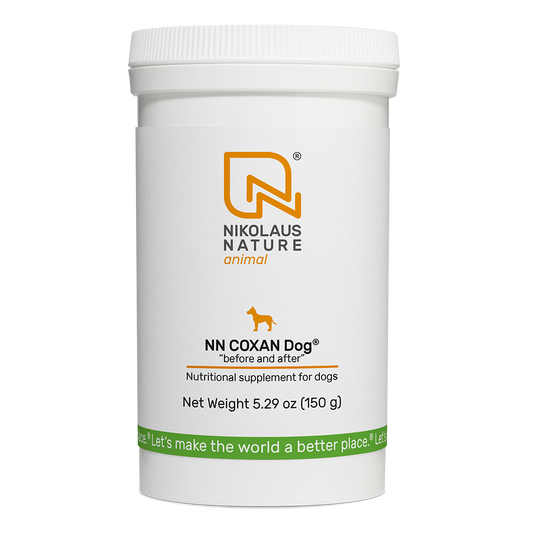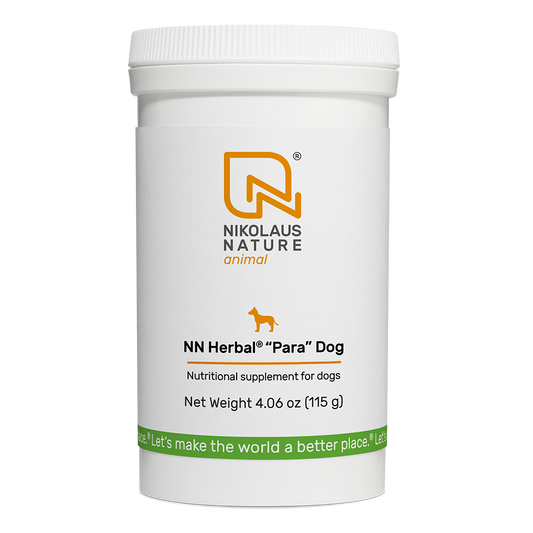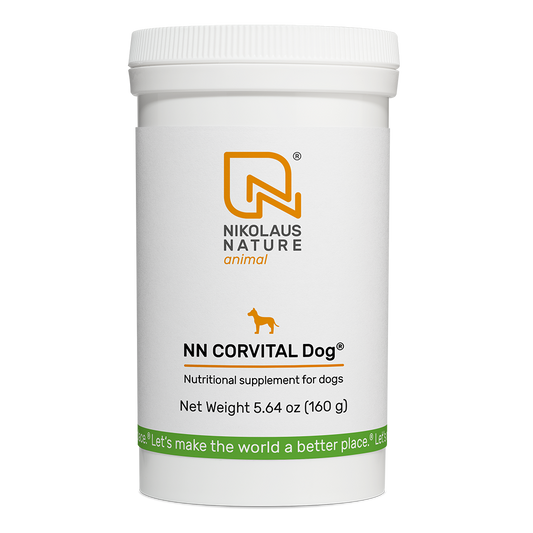Impact of GMOs on your pet’s health
Genetically modified organisms have unfortunately become something almost commonplace in the animal feed industry. However, there are still many unanswered questions about GMOs: How can they get into our dogs' food? What should we look for when buying dog food and dog food supplements? What influence do GMOs have on the health of our dogs? We answer these and other questions in the following blog.

What are GMOs and how are they produced?
GMOs are "genetically modified organisms" - meat or plant products whose DNA has been chemically or laboratory altered. With the help of a genetic engineering process in the laboratory, the genetic material of plants - mainly soybeans and corn - is artificially altered. The resulting transgenic plant has a new combination of genetic information. Gene plants, for example, possess properties that do not occur in nature in this way: For example, gene soy can grow in regions where the natural soybean cannot thrive. It is also resistant to certain herbicides, which means that if the pesticide is used in the vicinity of the genetically modified soybean, everything around the plant dies. Genetically modified corn also often uses a pesticide that cannot be washed off later during processing. Corn is the number one crop in the U.S., and farmers additionally treat it with various pesticides.
Despite many unanswered questions and unclear health effects, the FDA's requirements for research, testing, and safety measures for drugs and GMOs differ greatly in the USA. While there are strict guidelines to follow for drug approval, there are very lax regulations for GMOs.
GMOs and their significance for humans and animals
In principle, the effects of genetic engineering on human and animal health are not precisely known and are currently the subject of intensive research. However, there are already sufficient examples of genetic engineering posing risks to human and animal health. In the USA, there are already clear trends: for example, there is an increasing number of cases of illness in people in whose blood genetically modified toxins have been detected. Such toxins have also been detected in the blood of babies. 88% of the corn grown and 93% of the soy processed into animal feed in the USA is genetically modified1. The farm animals eat the genetically modified feed and via the detour of the meat it reaches not only the body of humans, but also via the dog food into the organism of our pets.
Genetically modified foods and their long-term effects
The long-term effects and harms of genetically modified foods are also not yet well known or researched. Preliminary findings suggest that allergies, organ failure and poisoning, and various health complaints may be possible effects of GM foods. For example, a 2012 study2 on rats showed that rats fed GM corn had a significantly shortened life expectancy. In addition, a significant increase in severe tumor disease and liver and kidney damage was observed. The current data only provide indications of short-term developments; there is still a great deal of uncertainty about consequential damage and long-term developments, which is why the admixture of GMOs in food and feed continues to be viewed very critically.

GMOs and dog food
Dog food may contain genetically modified grain meal or GM soy. However, soy, in particular, is not always clearly identifiable as such in the dog food ingredient list. Pay special attention to ingredients such as hydrogenated oil, lecithin, or emulsifiers - especially if there is no additional information about the GM-free production of the product. The effects of genetically modified substances in the dog's digestive tract are also uncertain. Purely theoretically, bacteria, pests, or viruses could trigger new, unpredictable mutations in genetically modified soy plants. These enter the dog's organism via the dog food and could cause infections and allergies. Researchers also point out the possibility that foreign genes in dog food can cause resistance to antibiotics. Therefore, dog food or dog supplements should be checked very carefully for their ingredients before purchase.
How to succeed in GMO-free dog feeding
As dog owners, we are responsible for the health and care of our four-legged friends. A growing awareness of the ecological risks of genetically modified plants makes many dog owners concerned about the potential health consequences for their pets. As responsible dog owners who want to protect our dogs, it is important to find out exactly what is in the dog food we serve them every day. When shopping for dog food, one should look for products with explicit references such as "GMO-free" or "produced without genetic engineering". These labels indicate that the ingredients used in the product are free from genetically modified organisms. Additionally, it is advisable to carefully read the ingredient list and look for any potential sources of GMOs, such as soy or corn.
How to succeed in GMO-free dog feeding
Choosing organic dog food can also be a good option, as organic certification often includes restrictions on the use of GMOs. Look for products that are certified organic by reputable organizations. Furthermore, consider supplementing your dog's diet with fresh, whole foods. This can include lean meats, vegetables, and fruits that are known to be free from GMOs. However, always consult with your veterinarian before making any significant changes to your dog's diet. By being proactive and informed about the ingredients in your dog's food, you can ensure that you are providing them with a GMO-free diet that promotes their overall health and well-being.






